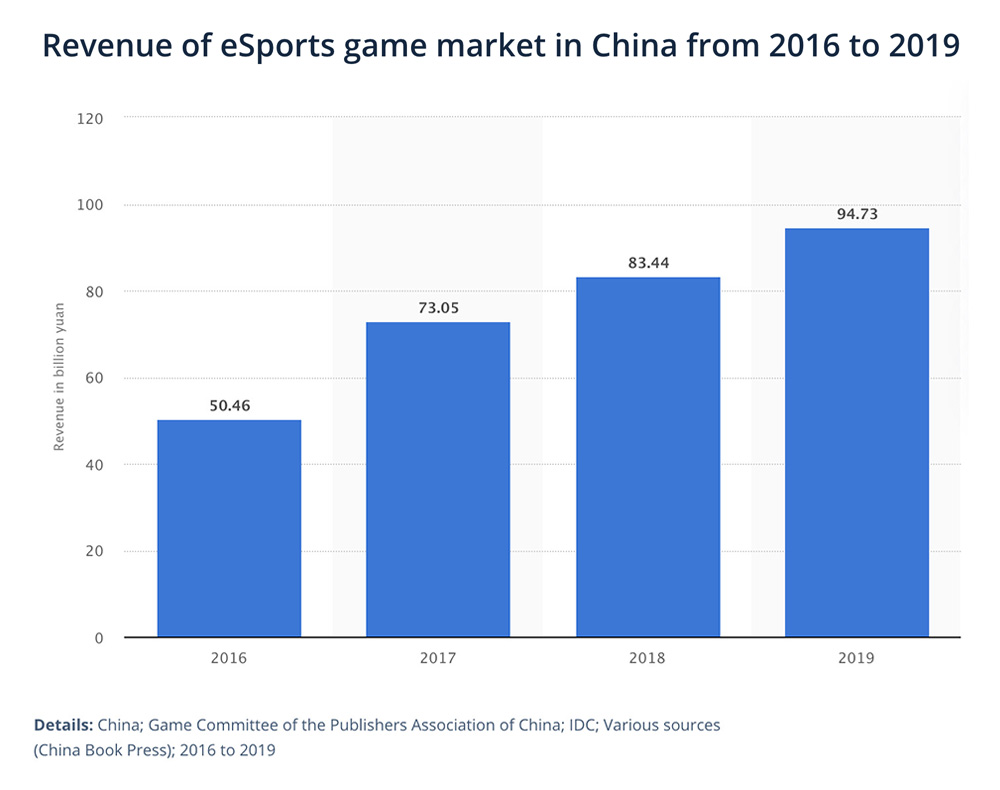By Richard Whiddington
- Shanghai is building a $900 million e-sports events hub set to open in 2024.
- The 6,000 seat venue will integrate additional entertainment options, evidencing an “e-sports plus” model.
The architectural rendering resembles a fuchsia jellyfish hovering above airbrushed Shanghai streets, but though futuristic in appearance, the outdoor plaza to the the city’s newest e-sports event center is in tune with a burgeoning contemporary trend — a physical manifestation of China’s multibillion dollar gaming industry.
The specs are compelling. When the Shanghai International New Cultural and Creative E-sports Center opens in 2024, the 500,000 square-meter space not only aims to be the home base for elite e-sports teams and host prestigious e-sports tournaments, but function as an entertainment hub in its own right. On top of a 6,000 seater arena, the project by property developer SuperGen is incorporating a hotel, a gaming museum, an indoor skydiving center, and extensive retail space.
With more than 600 million gamers, the industry surrounding China’s vast, demographically diverse, and highly engaged e-sports fanatics has been closely followed for more than a decade. Until a couple of years ago, however, offline gaming experiences typically entailed a trip to the local smoke-filled internet cafe. Now, it’s being viewed as a soft power play, a cross-industry GDP boon, and a potentially lucrative arm of the domestic tourism industry by tech giants, property moguls, and local governments alike.
China’s e-sports industry has seen a steady year-on-year growth in revenue. Image: Statistica
On a global level, these large e-sports venues place China at the forefront of the fastest growing entertainment sector and serve “to strengthen China’s reputation and ambitions to become the global e-sports capital,” says Tom Elsden, Business Director at Mailman Group, which recently released a comprehensive performance index of China’s e-sports teams.
China’s authorities have shown an unrivaled willingness to incentivize the sector’s growth in cities, believing flourishing e-sports scenes will boost media, travel, and equipment industries. This has led to public-private partnerships between cities and tech-gaming giants with Chengdu bonding with Tencent and NetEase with Guangzhou and a new generation of e-sports centers being built across the country.
Chongqing’s brand new Zhongxian esports stadium seats up to 7,000 and includes a luxury hotel and incubator space, Hangzhou’s local authorities unveiled a sprawling e-sports town in 2018, and Chinese tourist favorite Hainan has a $150 million development fund geared to adding an e-sports facet to the island’s travel economy.
Venues are following Millennial and Gen Z spending habits and creating a model that might be considered “e-sports plus” with revenue being draw from more than ticket and merchandise sales. “[e-sports] has a passionate following and fans are willing to travel and spend money to follow their favorite players and teams, this is why the full e-sports experience makes sense.”
Months before ground was broken in Shanghai’s Minhang district this January, the city offered proof of its dominant place within the e-sports universe when it hosted the League of Legends World Championships. The highlight of the gaming calendar was originally set to be staged across numerous Chinese cities, but with coronavirus jeopardizing such arrangements, government and private enterprises swooped to stage the month-long tournament. The event’s popularity? It received 3 million registrations for a mere 6,000 tickets.
In 2021, League of Legends will once again return to China, this time making a peripatetic tour of the country. Most pitstops will evidence gleaming new e-sports facilities designed to draw audiences who stay and spend furthering the impression that the growth in China’s offline e-sports industry is only just beginning.
Jing Culture & Commerce



